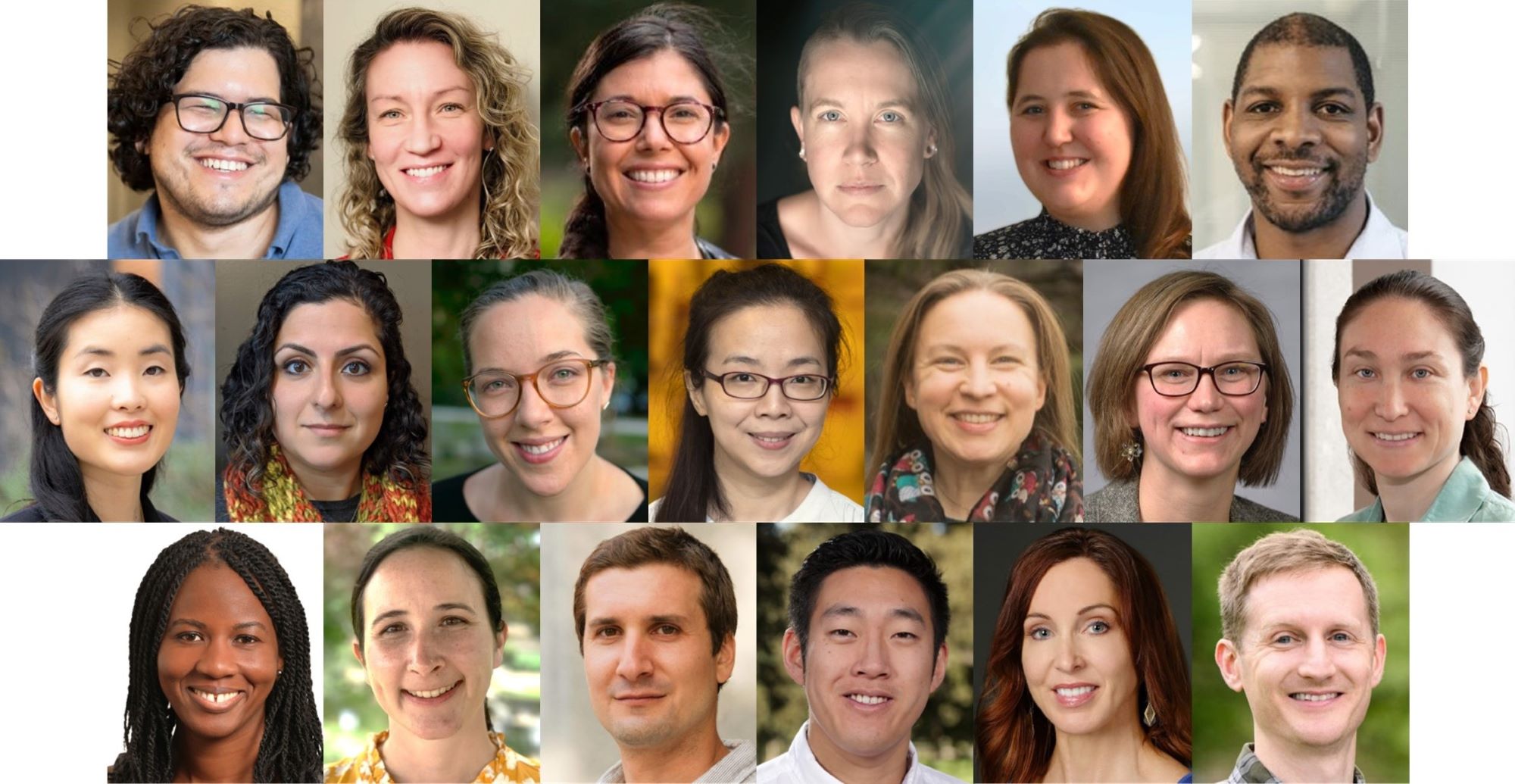RCSA Welcomes 2024 Class of Cottrell Scholars

Top row: Carlos Argüelles Delgado, Bernadette Broderick, Lía Corrales, Katherine de Kleer, Meagan Elinski, Jacob Gayles. 2nd row: Leslie Hamachi, Farnaz Heidar-Zadeh, Tova Holmes, Fang Liu, Anne Medling, Maren Mossman, Johanna Nagy. Third row: Denise Okafor, Rebecca Rapf, Paul Robustelli, Timothy Su, Jessica Swanson, Michael Welsh.
Research Corporation for Science Advancement, America's first foundation dedicated wholly to science, has named 19 early career scholars in chemistry, physics, and astronomy as recipients of its 2024 Cottrell Scholar Awards. Each awardee receives $120,000.
“These awardees stand out not just for their excellence in teaching and research but for their potential,” said Daniel Linzer, President & CEO of RCSA. “The advancement of both science and society depend on the fresh ideas and the dedication to student learning that we see in Cottrell Scholars, including the class of 2024.”
Cottrell Scholars are chosen through a rigorous peer-review process of applications from public and private research universities and primarily undergraduate institutions across the United States and Canada. Their award proposals incorporate both research and science education.
This year’s awardees represent 19 different institutions. For four of those institutions, this is their first Cottrell Scholar.
“This is a distinguished and diverse class,” said RCSA Senior Program Director Silvia Ronco. “We are delighted to welcome these new awardees to the Cottrell Scholar community and look forward to seeing their contributions as teachers and mentors, scientists, and leaders.”
The awards are named for educator, inventor, and science visionary Frederick Gardner Cottrell, who founded Research Corporation for Science Advancement in 1912.
Since the first class in 1994, the Cottrell Scholar community has become an active, multigenerational and multidisciplinary force comprising more than 500 awardees from a wide variety of colleges and universities across the United States and Canada.
As their careers advance, Cottrell Scholars become eligible to compete for several additional levels of funding through the Cottrell Plus Awards. Scholars meet each July at the annual Cottrell Scholar Conference to network, exchange ideas, and develop collaborative projects with potential national impact. This year’s event is scheduled for July 17-19 in Tucson, Arizona.
This year’s Cottrell Scholars are:
Carlos Argüelles Delgado, physics, Harvard University – Searching for New Physics with Galactic Neutrinos
Bernadette Broderick, chemistry, University of Missouri – A New Tool to Probe Condensed-Phase Chemistry: Rotational Spectroscopy of Buffer-Gas Cooled Molecules Desorbed from an Ice Surface
Lía Corrales, astronomy, University of Michigan – Unveiling Cosmic Treasures: Exploring the Secrets of Astromineralogy with X-Ray Imaging Spectroscopy
Katherine de Kleer, astronomy, California Institute of Technology – Planetesimal Interiors: Searching for Evidence of Core Material
Meagan Elinski, chemistry, Hope College – Chemical-Mechanical Control over Nanoparticle-Hydrogel Sliding Interfaces
Jacob Gayles, physics, University of South Florida – Strain Manipulation of Charge and Spin Dynamics in 2D Magnets
Leslie Hamachi, chemistry, California Polytechnic State University, San Luis Obispo – Colloidal Stabilization of Covalent Organic Frameworks with Acid-Base Chemistry and STEM Educator Training
Farnaz Heidar-Zadeh, chemistry, Queen's University – Combining Quantum Chemistry Concepts and Machine Learning for Drug Discovery
Tova Holmes, physics, University of Tennessee, Knoxville – Next Generation Beams: Exploring the Potential of Muon Acceleration
Fang Liu, chemistry, Emory University – Machine Learning Aided Quantum Chemistry Discovery in the Solution Phase
Anne Medling, astronomy, University of Toledo – Doing Our Homework: Direct Tests of Black Hole Accretion Rate Prescriptions
Maren Mossman, physics, University of San Diego – Cloud-Based Investigations of Quantum Hydrodynamics in Ultracold Atomic Gases
Johanna Nagy, physics, Case Western Reserve University – Measuring Cosmic Birefringence in the Presence of Galactic Foregrounds and Improving Career Preparation through Advanced Physics Labs
Denise Okafor, chemistry, Pennsylvania State University – Allostery and Architecture: Building and Validating Functional Models of Multidomain Receptors
Rebecca Rapf, chemistry, Trinity University – Interface-Induced Changes to Electronic Structure and Reactivity of Environmentally Relevant Polycyclic Aromatic Species
Paul Robustelli, chemistry, Dartmouth College – Characterizing and Modulating Interactions of Disordered Proteins that Drive Biomolecular Condensate Formation and Cytotoxic Aggregation
Timothy Su, chemistry, University of California, Riverside – Skeletal Editing of Silicon Nanostructures & Student-Created Social Media Videos to Close the Achievement Gap
Jessica Swanson, chemistry, University of Utah – Probing the Role of Membranes in Bacterial Methane Oxidation with Multiscale Simulations
Michael Welsh, chemistry, Hamilton College – Characterization of Enzymes that Build and Degrade Spore Cortex Peptidoglycan
Research Corporation for Science Advancement is a private foundation that funds basic research in the physical sciences (astronomy, chemistry, physics, and related fields) at colleges and universities in the United States and Canada. It creates and supports inclusive communities of early career researchers through two core programs -- the Cottrell Scholar Program and Scialog -- as well as its newly launched RCSA Fellows initiative.






